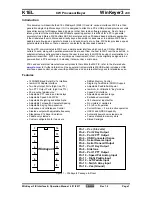
CAN Control Registers
1553
SPRUH22I – April 2012 – Revised November 2019
Copyright © 2012–2019, Texas Instruments Incorporated
M3 Controller Area Network (CAN)
23.15.10 New Data Registers (CAN NWDAT)
These registers hold the NewDat bits of the implemented message objects. By reading out these bits, the
CPU can check for new data in the message objects. The NewDat bit of a specific message object can be
set/reset by the CPU via the IF1 or IF2 Interface register sets, or by the message handler after reception
of a data frame or after a successful transmission.
Figure 23-28. New Data Register (CAN NWDAT) [offset = 0x9C]
31
16
NewDat[31:16]
R-0
15
0
NewDat[15:0]
R-0
LEGEND: R = Read; -
n
= value after reset
NOTE:
Bits 0 through 31 correspond to message object 1 through 32, respectively.
Table 23-14. New Data Registers Field Descriptions
Bit
Field
Value
Description
31-0
NewDat[31:0]
New Data Bits (for all message objects)
0
No new data has been written into the data portion of this message object by the message handler
since the last time when this flag was cleared by the CPU.
1
The message handler or the CPU has written new data into the data portion of this message object.
23.15.11 Interrupt Pending Registers (CAN INTPND)
These registers hold the IntPnd bits of the implemented message objects. By reading out these bits, the
CPU can check for pending interrupts in the message objects. The IntPnd bit of a specific message object
can be set/reset by the CPU via the IF1 or IF2 Interface register sets, or by the message handler after a
reception or a successful transmission.
Figure 23-29. Interrupt Pending Register (CAN INTPND) [offset = 0xB0]
31
16
IntPndReg[31:16]
R-0
15
0
IntPndReg[15:0]
R-0
LEGEND: R = Read; -
n
= value after reset
NOTE:
Bits 0 through 31 correspond to message object 1 through 32, respectively.
Table 23-15. Interrupt Pending Registers Field Descriptions
Bit
Field
Value
Description
31-0
IntPndReg[31:0]
Interrupt Pending Bits (for all message objects)
0
This message object is not the source of an interrupt.
1
This message object is the source of an interrupt.
















































